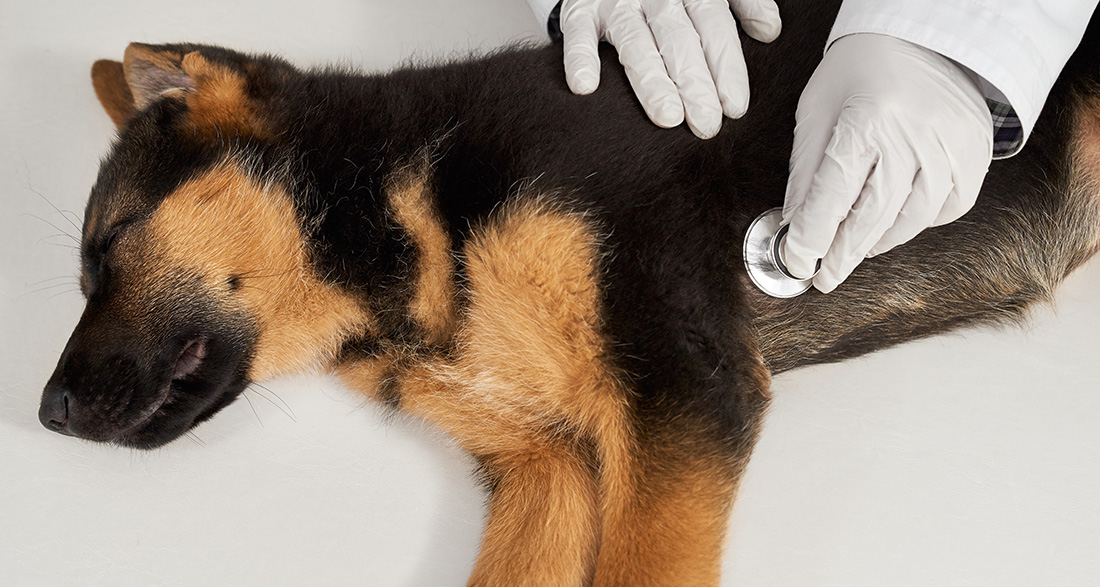Gastritis in dogs is a insidious condition that can trigger pain, nausea, and apathy. Left untreated, it can lead to gastric ulcers, stomach cancer, and in the worst-case scenario, gastric perforations that can be fatal. Recognizing, diagnosing, and treating gastritis correctly, as well as preventing it, are extensively discussed here. In case of occurrence, proper nutrition for the dog is also crucial.
What is Gastritis?
Gastritis is derived from the Greek word “Gaster,” which means stomach. The suffix “-itis” denotes an inflammatory process. Therefore, gastritis is a “stomach inflammation,” more precisely a gastric mucosal inflammation in dogs.
This inflammation can be chronic, lasting for an extended period, or acute, lasting only a few days. Chronic gastritis is often challenging to manage and may leave lasting damage. Left untreated, it can lead to gastric ulcers and, in the worst-case scenario, gastric perforations that can be fatal.
What Happens in a Dog’s Stomach During Gastritis?
The stomach is lined internally with a thin mucous membrane that protects the sensitive stomach wall from the stomach acid produced to dissolve food within the stomach.
Did you know?
A dog’s stomach acid is exceptionally acidic, much more so than that of humans. With its stomach acid, a dog can dissolve bones, for example.
In the case of acid reflux, this can become a problem. If there is an overproduction of stomach acid, the gastric mucous membrane no longer provides sufficient protection, allowing the stomach acid to attack the stomach wall. As a result, the cells gradually begin to deteriorate.
The body responds with inflammation. When the mucous membrane is damaged in a specific area, this mucosal defect is also referred to as a gastric ulcer.
If the body cannot repair the mucosal defects in the stomach, the stomach wall becomes progressively thinner. If it tears, it is referred to as a gastric perforation. It is crucial to recognize gastritis in dogs promptly and intervene early!
Caution:
A gastric perforation is an emergency! If this happens, the dog must be taken to a veterinarian immediately. The stomach must be surgically closed, and the abdominal cavity must be flushed.
Causes of Gastritis in Dogs
Gastric mucosal inflammation can arise from various reasons in dogs. The following factors are often precursors to gastritis:
- Stress: Stressful situations often lead to an overproduction of stomach acid, which can attack the gastric mucosa.
- Helicobacter and other pathogens: Pathogens can lead to gastritis in dogs. Possible pathogens include the distemper virus, the parvovirus, and especially Helicobacter in dogs. Helicobacter are spiral-shaped bacterial strains that, when present in increased amounts in the stomach, stimulate acid production and damage the gastric mucosa.
- Medications: Some medications directly attack the gastric mucosa and gastric flora. These medications include certain pain relievers and antibiotics.
- Parasites: Such as worms or Giardia.
- Food intolerances.
- Foreign substances/foreign bodies: Ingesting irritating substances can lead to an attack on the gastric mucosa. Even snow mixed with a lot of salt can cause gastritis in dogs. Foreign bodies can injure the gastric mucosa and trigger gastritis in dogs.
- Secondary to other diseases: Such as kidney or pancreatic diseases.
Gastritis in Dogs: How to Properly Recognize Symptoms
When a dog develops gastric mucosal inflammation, it often manifests in various nonspecific symptoms. The following symptoms can occur with gastritis:
- Nausea: Lip smacking, drooling, burping.
- Refusal to eat.
- Often, the dog experiences abdominal pain: Sensitivity to touch, arched back, tucked-in belly.
- Apathy (lack of interest).
- Vomiting.
- Fever: Temperatures above 39.0 degrees Celsius indicate an elevated body temperature; above 39.5 degrees Celsius is considered a fever in dogs.
- Weight loss.
- Black, tarry stool.
- Pale mucous membranes.
- Dehydration: Pasty mucous membranes, skin folds that flatten slowly.
- Diarrhea in puppies.
Did you know?
If gastritis has progressed to the point where the stomach wall is bleeding, the dog may develop anemia. This manifests as pale mucous membranes, apathy, and black stool.
Important: If these symptoms occur, it is essential to promptly consult a veterinarian!
The Path to Diagnosis: What Examinations are Necessary?
If a dog exhibits two or more symptoms, it is advisable to promptly consult a veterinarian. Only here can a definitive diagnosis be made.
Examination Process:
- Anamnesis interview: The veterinarian gains an overview through precise questioning.
- General examination of the animal.
- Laboratory tests: A blood test can detect possible inflammations, electrolyte imbalances, and organ diseases.
- Ultrasound examination: The ultrasound device allows for a closer look at the gastric wall and examination for potential inflammatory processes.
- Gastroscopy: Using a small camera, the veterinarian passes through the mouth and esophagus into the stomach, thoroughly examines the gastric mucosa, and may take samples if necessary. The examination is performed under anesthesia.
Diagnosis of Gastritis, and Now?
After diagnosing gastritis, a varying treatment is performed based on the severity of the condition. Gastric rest is crucial, and easily digestible food is recommended, such as rice, potatoes, and chicken. Various pet food manufacturers now offer suitable options. Specialized advice is advisable for cases of food intolerances.
Medications are also available. Depending on the severity of gastritis, the veterinarian may prescribe medications such as acid blockers, mucosal protectants, or anti-nausea drugs.
Rest aids in recovery. Short walks, minimal playtime, and ample sleep are beneficial. A calm environment should be ensured.
Dog owners should also ensure sufficient fluid intake. Many bowls can encourage drinking. In emergencies, the veterinarian can administer an infusion to balance lost fluids.
Depending on the cause of gastritis, different additional treatment strategies may be necessary, which the veterinarian will inform about.
Prevention: How to Prevent Gastritis?
The many different causes do not always make it easy to prevent stomach issues in dogs adequately. Nonetheless, some actions can be effective against the disease:
- Regular feeding times.
- Avoiding stress.
- Regular deworming, approximately every twelve weeks.


